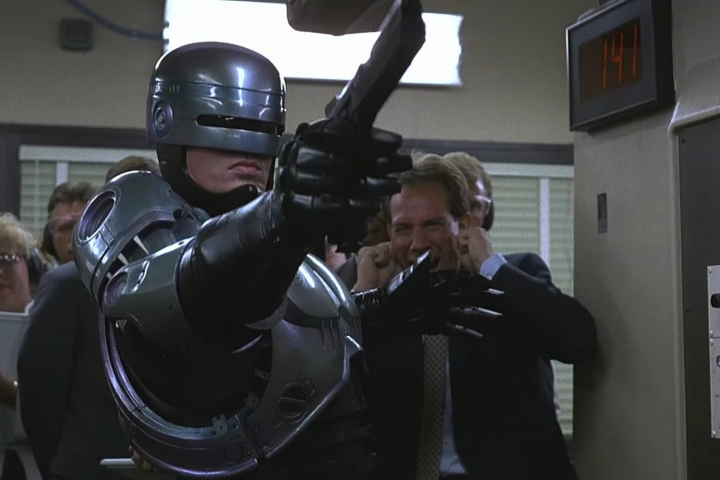
Dead or alive, the RoboCop franchise is coming back to the big screen.
Paul Verhoeven’s wildly successful 1987 film about a police officer brought back from the dead as a powerful cyborg law-enforcement agent spawned multiple sequels, spinoffs, a 2014 remake, and even a pair of animated series — and now RoboCop is coming back online again with District 9 and Chappie director Neill Blomkamp behind the camera.
The new film is expected to be a direct sequel to Verhoeven’s original movie, ignoring the events of 1990’s Robocop 2, and will be based on an unused script for the sequel penned by RoboCop screenwriters Ed Neumeier and Michael Miner. According to Deadline, the film will be titled RoboCop Returns, with Neumeier and Miner serving as producer and executive producer, respectively, on the film. Justin Rhodes, who scripted the upcoming reboot of the Terminator franchise, will rewrite Neumeier and Miner’s original script for RoboCop 2 and update it for the new film.
The only plot synopsis for the film released at this point keeps things relatively vague: “Anarchy reigns and the fate of Detroit hangs in the balance as RoboCop makes his triumphant return to fight crime and corruption.”
“The original definitely had a massive effect on me as a kid,” said Blomkamp in a statement accompanying the announcement. “I loved it then and it remains a classic in the end of 20th century sci-fi catalog, with real meaning under the surface. Hopefully, that is something we can get closer to in making a sequel. That is my goal here.”
The original RoboCop cast Peter Weller as Alex Murphy, a Detroit Police Department officer who is killed on duty, only to have most of his body replaced with powerful cybernetics. The film’s over-the-top violence infamously earned it an “X” rating before Verhoeven edited it sufficiently for an “R” release, and it dealt with hot-button, Reagan-era themes such as corporate greed, media sensationalism, and capitalism run amok. The potential future it explored — in which private companies began running various state and federal government agencies as profit-based businesses — soon seemed eerily prescient in the years that followed the film’s release.
“What I connected to as a kid has evolved over time,” said Blomkamp.” At first, the consumerism, materialism, and Reaganomics, that ’80s theme of America on steroids, came through most strongly. But as I’ve gotten older, the part that really resonated with me is identity, and the search for identity. As long as the human component is there, a good story can work in any time period, it’s not locked into a specific place in history. What’s so cool about RoboCop is that, like good Westerns, sci-fi films, and dramas, the human connection is really important to a story well told. What draws me now is someone searching for their lost identity, taken away at the hands of people who are benefiting from it, and seeing his memory jogged by events. That is most captivating.”
The 1987 film made $53.4 million off a $13 million budget and earned three Academy Award nominations in technical categories, winning the Academy Award for Best Sound Editing. Two sequels were released, with 1990’s RoboCop 2 bringing on Star Wars: Episode V – The Empire Strikes Back director Irvin Kershner. That film earned mixed reviews and was followed by RoboCop 3 in 1993. The kid-friendly third installment, directed by Fred Dekker, received overwhelmingly negative reviews and failed to cover its production costs.
A reboot of RoboCop was released in 2014, with filmmaker Jose Padilha behind the camera and Joel Kinnaman in the title role. That film underperformed in U.S. theaters, but ended up earning $242.7 million worldwide.



